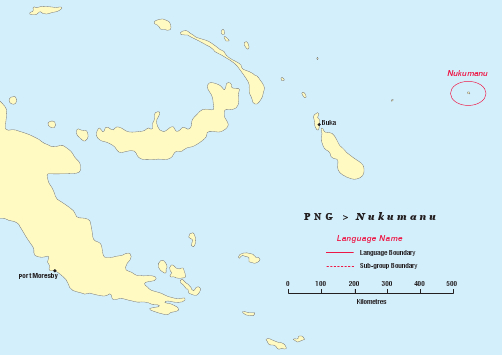Nukumanu (pop. 730) is a Polynesian language in Papua New Guinea. The language is closely related to Luangiua in the Solomon Islands; there is frequent contact and people can understand each other easily. The language is also closely related to the Takuu and Nukuria languages, both in Papua New Guinea. There are no grammars or dictionaries printed in the Nukumanu language.
Nukumanu is an atoll and has only 1.8 square miles of habitable land surrounding a 138 square mile lagoon. Even at the highest points, elevation is barely more than 6 feet above sea level. With so little land to support a growing population, many young people go away to high school on the mainland where they find jobs to support their family back on the atoll. The people of Nukumanu have set up an export business for sea cucumbers and trochus shells and the men dive to harvest these. Weather and sea conditions, however, determine the success of this enterprise. Due to over-harvesting these enterprises are sometime shut down by the government to allow stocks to return to sustainable levels. Lack of transportation from the atoll makes the marketing of any goods very difficult.
Bible Translation in the Nukumanu language
In the 1980s, young adults who had gone away to school returned with the good news of Jesus Christ. At first they were persecuted, but now three church groups have been established. Almost everyone on the atoll attends church. Yet, many still question this new faith. As one elder put it, “We would like to know what your God has to say, but we don’t trust any man to tell us; he might lie. We want to read it for ourselves in our own language.”
Sue Andersen, an SIL literacy consultant, mentored the translation team for many years through Translators Training Courses, including Bible background, exegesis and principles of translation. Two translators completed the translation of the New Testament, with Edmond Teppuri as main translator (read the story of how Edmond got involved here). They were assisted by Isles of the Sea translation consultant Nico Daams. In February 2014, the New Testament was dedicated.
